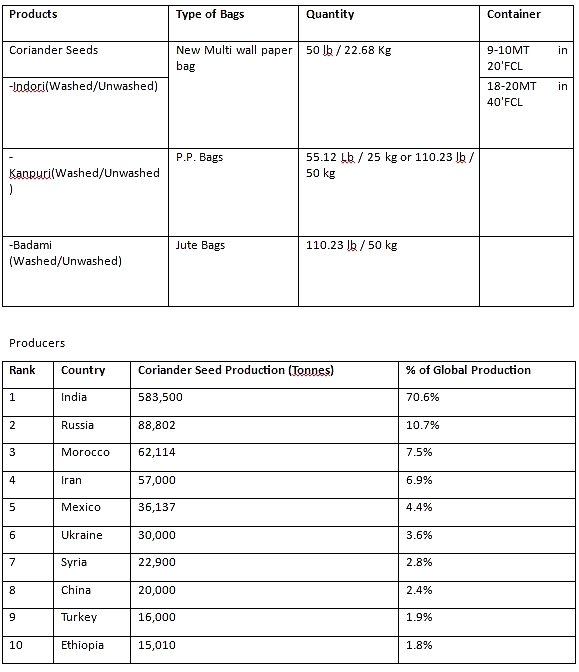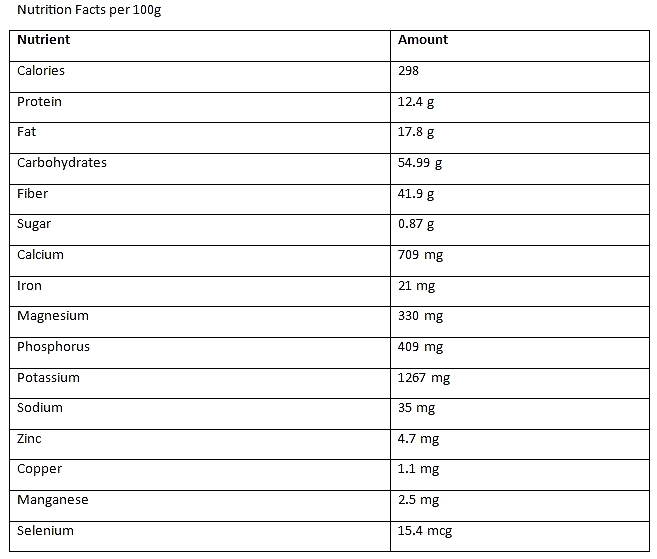Staple Food -Agriculture Farm Produce - Cereals- Wheat, Rice, Grains- Bengal gram whole,White Sesame Seeds Pulses- Tur Dal-Pigeon peas split , Moong Dal, Chana Dal-Bengal gram split Millets, Flours- Dalia, Rava sooji, Oils- Soyabean Oil,...
- kapil@nuvoxhealthcare.com
- mumbai, , Navi Mumbai, Maharashtra, India. 400614
© 2020 Satyaa. All Rights Reserved
Coriander Seeds
-
Product is not available
Accept Small Orders: No
Country of origin : India
-
Additional Information
There are several types of coriander seeds, including Indian, Moroccan, and Russian coriander. Indian coriander seeds are small, round, and have a light brown color. Moroccan coriander seeds are larger, oval-shaped, and have a yellowish-brown color. Russian coriander seeds are the largest, with a round shape and a dark brown color. Coriander seeds are typically harvested in the late summer or early fall, when the plant has matured and the seeds have turned brown.
Coriander seeds have many health benefits. They are a good source of fiber, antioxidants, and vitamins and minerals, such as vitamin C, magnesium, and potassium. Coriander seeds may help lower cholesterol, regulate blood sugar, and aid digestion. They also have antimicrobial properties and may help protect against foodborne illnesses. Coriander seeds can be used in cooking or taken as a supplement in capsule form.
Storage
Coriander seeds and oil can be found in markets year-round and are commonly used as a spice. To ensure good quality, coriander seeds should release a pleasant, slightly peppery flavor when squeezed between the index and thumb fingers. When purchasing, it is recommended to buy whole seeds instead of coriander powder, as the latter may contain adulterated spices.
When storing at home, it is important to keep the seeds in a cool, dry, and dark place in airtight containers. This will allow them to remain fresh for many months and can be ground using a hand mill when needed. If using ground or powdered coriander, it should be stored in an airtight container in the refrigerator. It is best to use the spice powder as early as possible since it can lose its flavor quickly due to the evaporation of essential oils.
Common Packing For Container Shipment


Facts and Health Benefits1. Digestive health: Coriander seeds contain compounds that stimulate digestive enzymes, which can help improve digestion and relieve symptoms such as bloating and gas.
2. Anti-inflammatory properties: Coriander seeds contain anti-inflammatory compounds that may help reduce inflammation in the body, which can benefit conditions such as arthritis and other inflammatory disorders.
3. Heart health: Coriander seeds may help lower cholesterol levels and blood pressure, which can reduce the risk of heart disease.
4. Antimicrobial properties: Coriander seeds contain compounds that have antimicrobial properties, which can help fight against harmful bacteria and viruses.
5. Blood sugar control: Coriander seeds may help regulate blood sugar levels, which can be beneficial for people with diabetes.
6. Rich in antioxidants: Coriander seeds contain several antioxidants that can help protect against cellular damage and reduce the risk of chronic diseases.
7. Skin health: Coriander seeds may help improve skin health by reducing inflammation and protecting against oxidative damage.
-
Reviews ()
Write a Review








